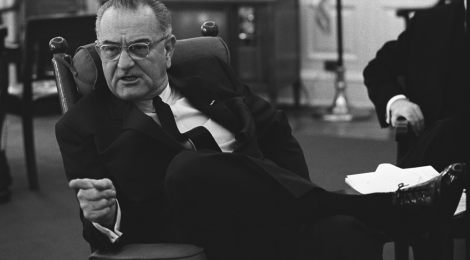Documenting the world through short films
Documentary programmer Wotienke Vermeer introduced the selection:
“Something I always try to demonstrate with the short films is that not every story is fit to be told in 52 or 90 minutes. We’re very much used to these lengths in documentary. Some films, like the last one tonight (The Only Flower), is enough to be told in six minutes.”
The first film, You Can’t Always Get What You Want by Scott Calonico, showed recently declassified White House tapes from when Lyndon B. Johnson was President. The humorous nine-minute film demonstrated his struggles with daily issues in the Oval Office, including misunderstandings with telephone operators, what he deemed to be a lack of “attractive Negros” in governmental positions, as well as limited dessert options at the White House. Director Scott Calonico also made the short film Mondo Ford, about former President Gerald Ford and his implication in the assassination of JFK.

Vladimir Putin in Deep Concentration, by directors Dana O’Keefe and Sasha Kliment, observed different manifestations of non-verbal communication in one of the world’s most powerful men. It examined the mystery behind Putin’s implacably blank face and his way of walking, and highlighted how Russians have no choice but to allow his ambitions to take over the country.
The longest film of the night, Cutting Loose by Finlay Pretsell and Adrian McDowall, showed the dreams and desires of contenders in a yearly hairdressing competition in Scottish prisons. The audience discovered how hairdressing is helping many of Scotland’s most dangerous inmates come to terms with their crimes and preparing them for life beyond prison bars.
[vimeo clip_id=”37374795″ width=”400″ height=”225″]With Ink Ribbon Fingerprints, Pavel Braila gave a tribute to the typewriter, from its invention in the 1860’s to the closing of the last factory producing the machines in 2011. It demonstrated the typewriter’s close relationship with the industry of war and its key role in women’s emancipation.
The final short of the evening, The Only Flower by director César Pérez, followed botanist Steven Hemsley as he discovered how artificial flowers are replacing real ones throughout Beijing. As Hemsley analysed the fake plants as if they were new species, he demonstrated how people get used to the artificial aspects in their lives, comparing it with Beijing’s old quarter which was transformed into imitations to house fashion-brand shops.
[vimeo clip_id=”44952922″ width=”400″ height=”225″]